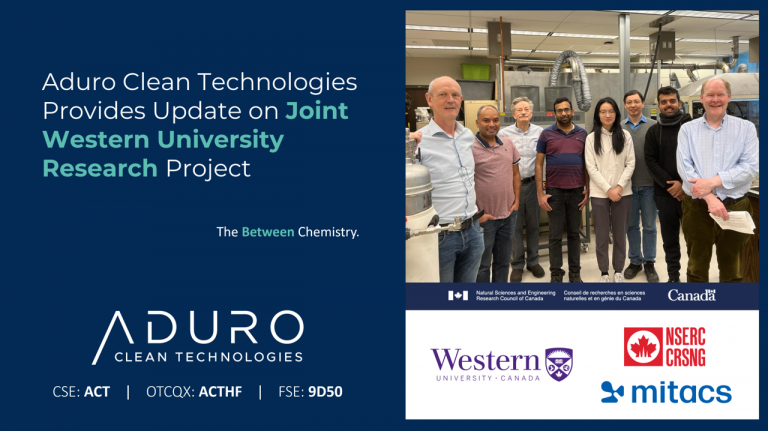Aduro Clean Technologies Inc, a Canadian technology company using the power of chemistry to transform lower value feedstocks like waste plastics, heavy bitumen and renewable oils into resources for the 21st century, is pleased to provide an update on its research project titled “Tuning Supercritical Fluids for Polymer Recycling to Monomers and Chemicals” in partnership with Western University.
Launched in early 2023 with a generous $1.15 million in grant funding from the NSERC Alliance and Mitacs Accelerate Grants Program, complemented by a $382,500 additional contribution from Aduro, this three-year project is to advance the company’s polymer recycling program through conscientious research, while providing high-quality training and mentoring to the project researchers to develop them as highly qualified personnel for advanced polymer recycling.
Under the leadership of Dr. Paul Charpentier and Dr. Cedric L. Briens at Western University, the team has conducted rigorous studies generating a significant knowledge database that supports the objective of advancing the recycling processes.
In April 2024, Dr. Charpentier reported on the project’s current status, focusing on the innovative recycling of polyolefins like LDPE, HDPE, and PP using Hydrochemolytic technology (HCT). This research investigates the applicability of HCT, catalytic and thermal processes, and the combination thereof to maximise the conversion of mixed plastic waste into valuable chemicals and streamline the recycling processes.
The project started with the investigation of applying HCT to polymer feedstock for benchmarking and training of personnel along with a thorough literature review and search on other recycling technologies and contaminants in waste plastic across the globe. A significant part of the study focused on understanding the solubility/miscibility and effect of reaction parameters which are crucial for enhancing chemical recycling efficiency. A critical aspect of the research aimed at identifying and quantifying impurities in polyolefins and understanding the fate of those impurities in different chemical recycling processes.
The research further delved into advanced sorting and processing techniques for polyolefin waste, laying the groundwork for more precise and effective recycling methods. These comprehensive studies represent a significant leap forward in polymer recycling, setting the stage for anticipated higher sustainable and efficient upcycling of plastics into valuable products.
The current phase will investigate the behaviour of contaminants under Hydrochemolytic technology and pyrolysis conditions in a methodical approach to building and enhancing the Company’s database so that when engaging with real-life waste feedstocks, the information generated becomes more useful in predicting issues when providing customer solutions. This knowledge is vital for improving recycling practices and to ensure higher efficiency and environmental benefits.



